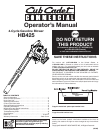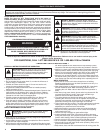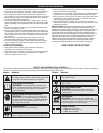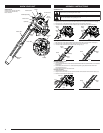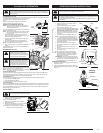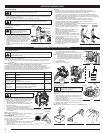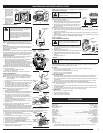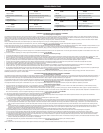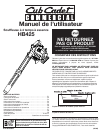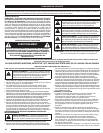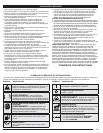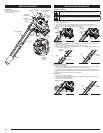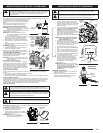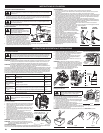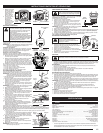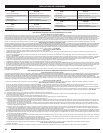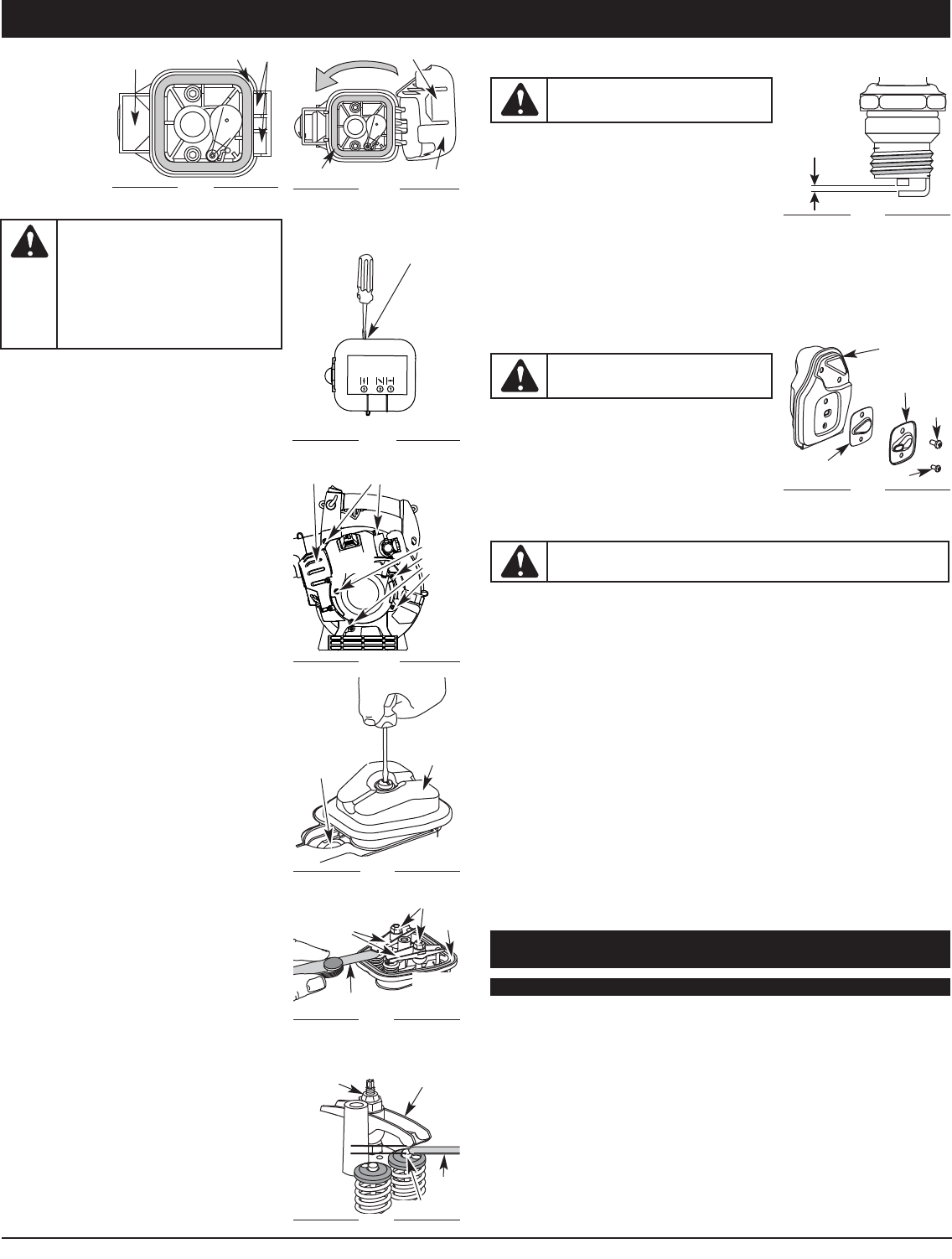
7
MAINTENANCE AND REPAIR INSTRUCTIONS
7. Reinstall the air filter
cover. Position the
hooks on the right
side of the air filter
cover into the slots
at the right side of
the back plate (Fig.
25).
8. Swing the cover to
the left until the tab
on the air filter cover
snaps into place in
the slot on the back
plate (Fig. 26).
CARBURETOR ADJUSTMENT
The idle speed of the engine is adjustable. An idle adjustment screw
is between the air filter cover and the engine starter housing (Fig. 27).
NOTE: Careless adjustments can seriously damage your unit. An
authorized service dealer should make carburetor adjustments.
Check Fuel
Old fuel is usually the reason for improper unit performance. Drain
and refill the tank with fresh fuel prior to making any adjustments.
Refer to Oil and Fuel Information.
Clean Air Filter
The condition of the air filter is important to the operation of the unit.
A dirty air filter will restrict air flow. This is often mistaken for an out
of adjustment carburetor. Check the condition of the air filter before
adjusting the idle speed screw. Refer to Air Filter Maintenance.
Adjust Idle Speed Screw
If, after checking the fuel and cleaning the air filter, the engine still
will not idle, adjust the idle speed screw as follows:
1. Start the engine and let it run at a high idle for a minute to
warm up. Refer to Starting/Stopping Instructions.
2. Release the throttle trigger and let the engine idle. If the engine
stops, insert a small phillips in between the Air Filter Cover and the
Engine Cover (Fig. 27). Turn the idle speed screw in, clockwise, 1/8
of a turn at a time (as needed) until the engine idles smoothly.
Checking the fuel, cleaning the air filter, and adjusting the idle speed
should solve most engine problems. If not and all of the following are true:
• the engine will not idle
• the engine hesitates or stalls on acceleration
• there is a loss of engine power
Have the carburetor adjusted by an authorized service dealer.
ROCKER ARM CLEARANCE
This requires disassembly of the engine. If you feel unsure or
unqualified to perform this, take the unit to a qualified service dealer.
NOTE: Inspect the valve to rocker arm clearance with a feeler
gauge after the first 10 hours of operation and every 40
hours of operation.
• The engine must be cold when checking or adjusting the rocker
arm clearance.
• This task should be performed inside, in a clean, dust free area.
1. Remove the 2 muffler cover screws with a flat blade or T-25
Torx head screwdriver (Fig. 28), then remove the cover.
2. Remove the 6 starter housing screws with flat blade or T-25
Torx head screwdriver (Fig. 28), then remove the housing.
NOTE: Make sure to store the screws so that they can be
reinstalled into their original holes.
3. Disconnect the spark plug wire.
4. Clean dirt from around the spark plug. Remove the spark plug from
the cylinder head by turning a 5/8 in. socket counterclockwise.
5. Clean dirt from around the rocker arm cover. Remove the
screw holding the rocker arm cover with a large flat blade
screwdriver or Torx T-25 bit (Fig. 29). Remove the rocker arm
cover and gasket.
6. Turn the flywheel slowly to bring the piston to the top of its
travel (known as top dead center). Check that:
• The piston is at the top of its travel while looking in the spark
plug hole (Fig. 29)
• Both rocker arms move freely, and both valves are closed.
If these statements are not true, repeat this step.
7. Slide the feeler gauge between the rocker arm and the valve return
spring. Measure the clearance between the valve stem and rocker
arm (Fig. 30 & 31). Measure both the intake and exhaust valves.
The recommended clearance for both intake and exhaust is .003 – .006 in. (.076 – 0.152 mm). Use a
standard automotive .005 in. (0.127 mm) feeler gauge. The feeler gauge should slide between the rocker
arm and valve stem with a slight amount of resistance, without binding. See Figures 30 and 31.
8. If the clearance is not within specification:
a. Turn the adjusting nut using a 5/16 inch (8 mm) wrench or nut
driver (Fig. 31).
• To increase clearance, turn the adjusting nut counterclockwise.
• To decrease clearance, turn the adjusting nut clockwise.
b. Recheck both clearances, and adjust as necessary.
9. Reinstall the rocker arm cover using a new gasket (Fig. 29).
Torque the screw to: 20–30 in•lb (2.2–3.4 N•m).
10. Check the spark plug and reinstall. See Replacing the Spark Plug.
11. Reinstall the spark plug wire.
12. Reinstall the engine cover. Check alignment of the cover before
tightening the screws. Tighten screws.
Fig. 25
Air Filter
Fig. 26
Back
Plate Slot
Back Plate
Slots
Air Filter Cover
Crochet
Idle Adjustment
Screw
Fig. 27
NOTE: Make sure that the screws are reinstalled into their original holes (Fig. 28).
REPLACING THE SPARK PLUG
Use a replacement part number 753-05784. The correct spark gap is
0.025 in. (0.635 mm.). Remove the plug after every 40 hours of
operation and check its condition.
1. Stop the engine and allow it to cool.
2. Remove the 2 plastic muffler cover screws with a flat blade or
T-25 Torx head screwdriver (Fig. 28), then remove the cover.
3. Remove the 2 plastic and 4 aluminum starter housing screws
with flat blade or T-25 Torx head screwdriver (Fig. 28), then
remove the housing.
NOTE: Make sure to store the screws so that they can be reinstalled into their original holes.
4. Grasp the plug wire firmly and pull the cap from the spark plug.
5. Clean dirt from around the spark plug. Remove the spark plug from the cylinder head by turning a 5/8
in. socket counterclockwise.
6. Replace cracked, fouled or dirty spark plug. Set the spark gap at 0.025 in. (0.635 mm.) using a feeler
gauge (Fig. 32).
7. Install a correctly-gapped spark plug in the cylinder head. Turn the 5/8 in. socket clockwise until snug.
If using a torque wrench, torque to:
110-120 in.•lb. (12.3-13.5 N•m)
Do not over tighten.
SPARK ARRESTOR MAINTENANCE
1. Remove the muffler cover. See Rocker Arm Clearance.
2. With a flat blade screwdriver or Torx T-20 bit and a T-25 bit,
remove the screws attaching the spark arrestor diverter to the
muffler (Fig. 33).
3. Remove the spark arrestor cover.
4. Remove the spark arrestor screen from the spark arrestor cover.
5. Clean the spark arrestor screen with a wire brush or replace it.
6. Reinstall the spark arrestor screen, spark arrestor cover, and
screws.
7. Reinstall the muffler cover.
CLEANING
Use a small brush to clean off the outside of the unit. Do not use strong detergents. Household cleaners
that contain aromatic oils such as pine and lemon, and solvents such as kerosene, can damage plastic
housing or handle. Wipe off any moisture with a soft cloth.
STORAGE
• Never store the unit with fuel in the tank where fumes may reach an open flame or spark.
• Allow the engine to cool before storing.
• Lock up the unit to prevent unauthorized use or damage.
• Store the unit in a dry, well-ventilated area.
• Store the unit out of the reach of children.
LONG TERM STORAGE
1. Drain all gasoline from the gas tank into a container. Do not use gas that has been stored for more
than 60 days. Dispose of the old gasoline in accordance to Federal, State, and Local regulations.
2. Start the engine and allow it to run until it stalls. This ensures that all gasoline has been drained from
the carburetor.
3. Allow the engine to cool. Remove the spark plug and put 5 drops of high quality motor oil into the
cylinder. Pull the starter rope slowly to distribute the oil. Reinstall the spark plug.
NOTE: Remove the spark plug and drain all of the oil from the cylinder before attempting to start the
blower after storage.
4. Change the oil, referring to Changing the Oil. Dispose of the old oil in accordance to Federal, State
and Local regulations.
5. Thoroughly clean the unit and inspect for any loose or damaged parts. Repair or replace damaged
parts and tighten loose screws, nuts or bolts. The unit is ready for storage.
TRANSPORTING
• Allow the engine to cool before transporting.
• Secure the unit while transporting.
• Drain the gas tank before transporting.
• Tighten gas cap before transporting.
Fig. 28
Adjusting
Nuts
Fig. 30
Rocker Arms
Feeler Gauge
Muffler
Cover
Starter
Housing
Starter Housing
Screws (2)
Starter
Housing
Screws
(4)
INTAKE
EXHAUST
O-Ring
Rocker Arm
Cover
Fig. 29
Spark Plug
Hole
CAUTION:
Do not sand blast, scrape, or
clean electrodes. Grit in the engine could
damage the cylinder.
Fig. 32
0.025 in.
(0.635 mm)
Culbuteur
Fig. 31
.003–.006 in
(0.076–
0.152 mm)
Feeler
Gauge
Valve Stem
Adjusting
Nut
Fig. 33
Muffler
Spark Arrestor
Screen
Spark Arrestor
Cover
T-25
Screw
T-20 Screw
WARNING: To avoid serious personal injury,
always turn your unit off and allow it to cool
before you clean or do any maintenance on it.
SPECIFICATIONS
ENGINE*
* All specifications are based on the latest product information available at the time of printing. We
reserve the right to make changes at any time without notice.
Engine Type . . . . . . . . . . . . . . . . . . . . . . . . . . . . . . . . . . . . . . . . . . . . . . . . . . . . . . . . . Air-Cooled, 4-Cycle
Displacement . . . . . . . . . . . . . . . . . . . . . . . . . . . . . . . . . . . . . . . . . . . . . . . . . . . . . . . . . . 1.5 cu. in. (25 cc)
Blower Operating RPM . . . . . . . . . . . . . . . . . . . . . . . . . . . . . . . . . . . . . . . . . . . . . . . . . . . . . . . . . 7,000 rpm
Idle Speed RPM . . . . . . . . . . . . . . . . . . . . . . . . . . . . . . . . . . . . . . . . . . . . . . . . . . . . . . . 3,200 – 4,400 rpm
Ignition Type . . . . . . . . . . . . . . . . . . . . . . . . . . . . . . . . . . . . . . . . . . . . . . . . . . . . . . . . . . . . . . . . . Electronic
Ignition Switch . . . . . . . . . . . . . . . . . . . . . . . . . . . . . . . . . . . . . . . . . . . . . . . . . . . . . . . . Momentary Switch
Valve clearance . . . . . . . . . . . . . . . . . . . . . . . . . . . . . . . . . . . . . . . . . . . 0.003–0.006 in. (0.076–0.152 mm)
Spark Plug . . . . . . . . . . . . . . . . . . . . . . . . . . . . . . . . Champion Spark Plug #RDZ4H or Similar Spark Plug
Spark Plug Gap . . . . . . . . . . . . . . . . . . . . . . . . . . . . . . . . . . . . . . . . . . . . . . . . . . . . 0.025 inch (0.635 mm)
Lubrication. . . . . . . . . . . . . . . . . . . . . . . . . . . . . . . . . . . . . . . . . . . . . . . . . . . . . . . . . . . . . . . . . . SAE 30 Oil
Crankcase Oil Capacity . . . . . . . . . . . . . . . . . . . . . . . . . . . . . . . . . . . . . . . . . . . . . . . . . . . . 2.03 oz (60 ml)
Fuel. . . . . . . . . . . . . . . . . . . . . . . . . . . . . . . . . . . . . . . . . . . . . . . . . . . . . . . . . . . . . . . . . . . . . . . . Unleaded
Carburetor. . . . . . . . . . . . . . . . . . . . . . . . . . . . . . . . . . . . . . . . . . . . . . . . . . . . . . . . Diaphragm, All-Position
Starter . . . . . . . . . . . . . . . . . . . . . . . . . . . . . . . . . . . . . . . . . . . . . . . . . . . . . . . . . . . . . . . . . . . . Auto Rewind
Muffler. . . . . . . . . . . . . . . . . . . . . . . . . . . . . . . . . . . . . . . . . . . . . . . . . . . . . . . . . . . . . . . Baffled with Guard
Throttle . . . . . . . . . . . . . . . . . . . . . . . . . . . . . . . . . . . . . . . . . . . . . . . . . . . . . . . . . . . . . . . . . Variable Speed
Fuel Tank Capacity. . . . . . . . . . . . . . . . . . . . . . . . . . . . . . . . . . . . . . . . . . . . . . . . . . . . . . . . . 14 oz (414 ml)
WARNING:
This unit will need to be running
during idle speed adjustment. Wear protective
clothing and observe all safety instructions to
prevent serious personal injury.
Also, DO NOT set unit on any surface except a
clean, hard area while starting or performing any
adjustments. Debris, such as gravel, sand, dust,
grass, etc., could be thrown by the blower tube
and damage property or cause serious injury to
bystanders or operator.
WARNING: To avoid serious personal injury, always turn your unit off and allow it to
cool before you clean or do any maintenance on it.



